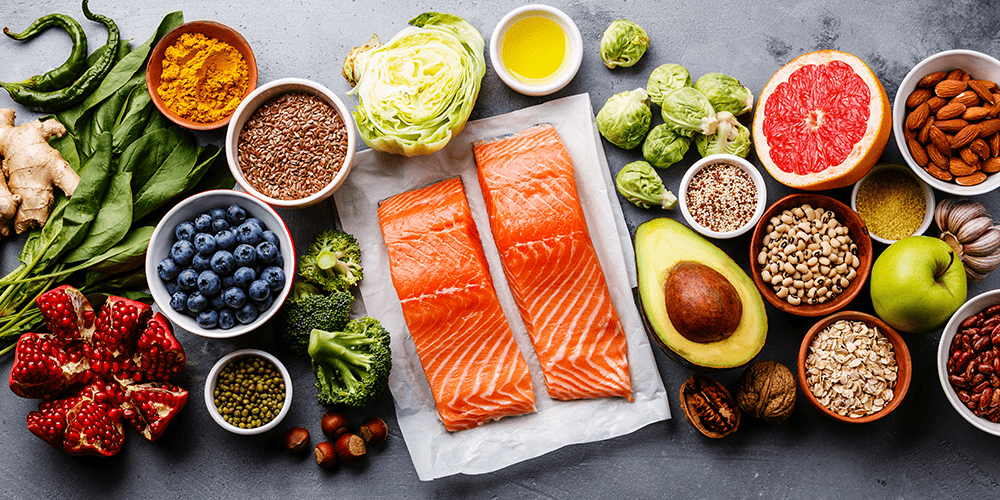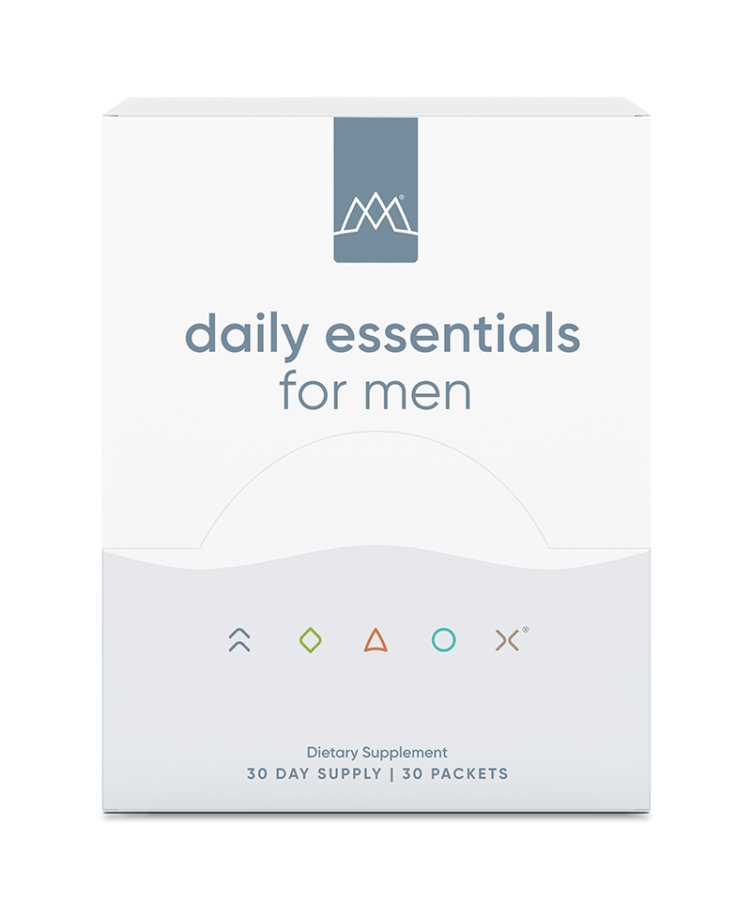As a man, you have a higher risk of dying from heart disease and other top causes of death than women do.1 The good news is that when you’re proactive about your health, you can prevent many of these major health risks to stay strong and healthy in your 40s, 50s, 60s, and beyond. Heart disease is the leading cause of death among men in America.2 Strokes are the fifth leading cause of death among men.3 Both conditions — about 80 percent of heart disease and stroke, in fact — are preventable.4
So is type 2 diabetes. Over 36 percent of men have prediabetes or higher-than-normal blood glucose levels.5 Left unchecked, prediabetes can increase the risk of developing diabetes, heart attack, and stroke.6 Yet like heart disease and stroke, prediabetes is reversible.7 Multiple factors typically contribute to these diseases, including high blood pressure, blood sugar, and triglycerides.8 Another factor is chronic inflammation, one of the most common drivers of many illnesses.9
Time Magazine called chronic inflammation “the secret killer” because it can occur for years before damage can occur. Symptoms of chronic inflammation aren’t always obvious.10,11 Being proactive about these and other issues can help you thrive at any age. Communicate clearly with your healthcare practitioner about any specific concerns. Yearly checkups help you monitor your weight, blood pressure, and other risk factors for disease. Screening tests can help detect problems early. You have plenty of ways to manage chronic inflammation and reduce other factors that can sabotage your health. These seven strategies can help you thrive at any age.
Make Smart Food Choices
Vibrant health starts at the end of your fork. Focus on these foods to provide the nutrients you need to thrive:

- Wild-caught seafood provides healthy amounts of protein, nutrients including vitamin D, and anti-inflammatory omega-3 fatty acids. Our Salmon Veracruz recipe makes a delicious way to get these nutrients.
- Foods such as avocado and extra-virgin olive oil are rich in monounsaturated fat, which can lower your risk of heart disease and stroke.12
- Nuts and seeds provide vitamins, minerals, fiber, and other nutrients for heart health and much more. Some of them — walnuts, flaxseeds, and chia seeds — also provide anti-inflammatory omega-3 fatty acids.13 Two handfuls of nuts daily could also improve your sexual health.14
- A colorful array of vegetables and low-sugar fruits such as berries contain vitamins, minerals, fiber, and antioxidants. Specific nutrients in kale, for instance, are anti-inflammatory to protect your heart, reduce your risk of cancer, and more.15
You’ll find these and other foods in our Core and Advanced Plans, which can help lower inflammation and other risk factors for disease.
Minimize or Eliminate Things That Sabotage Your Health
Equally important to maintain great health is what you don’t consume.
- Don’t smoke. If you do, talk with your healthcare practitioner about ways to quit.
- Avoid alcohol. If you do drink, stick with no more than two drinks a day.16
- Cut down on or eliminate sugary, processed foods. They can contribute to diabetes, heart disease, and other problems.17
Maintain a Healthy Weight
Carrying extra weight doesn’t look good, but it can also damage your health. Being overweight or obese can increase your risk of heart disease, stroke, type 2 diabetes some cancers, and more.18 Starting the day with a protein smoothie makes a simple, delicious way to manage your weight. Our Chocolate Smoothie uses Grass-Fed Whey Protein. Studies show whey protein can help you lose weight.19 Consider a ketogenic diet. This effective and simple plan helps you lose weight and keep it off.
Manage Stress Levels
Chronic stress increases your risk for diabetes, heart disease, getting sick, and many other problems.20 You can’t eliminate stress, but you manage those stress levels so they don’t sabotage your day or your health. You can learn 16 ways to relieve stress here.
Get Great Sleep
When you don’t sleep well, you’re more likely to make poor food choices and feel more stressed out the following day. Not getting enough sleep can also increase inflammation.21 Aim for eight hours of solid, uninterrupted sleep every night. Take our Sleep + Mood Formula if you have trouble falling or staying asleep.
Exercise Regularly
If you’re new to exercise, aim to move more, period. Always talk with your healthcare practitioner before undergoing a new fitness routine. Ideally, your weekly goals should be at least 150 minutes of moderate-intensity aerobic exercise such as walking, playing sports, or swimming. That’s 30 minutes of exercise, five times a week. Instead, you might opt for 75 minutes of vigorous exercise weekly. Add on a few muscle-strengthening activities such as weight lifting, too.22 Time is no excuse when it comes to exercise. Our Max T3 program gives you a full-body workout in just 12 minutes, in the comfort of your own home.
Get the Right Nutrients
Vitamins, minerals, and other nutrients play a key role to keep you healthy and manage inflammation as well as other problems that can harm you. Even with the healthiest diet, getting the ideal amounts of nutrients to thrive can be a challenge.23 Many people don’t get sufficient amounts of anti-inflammatory omega-3 fatty acids, for instance, which balance out the inflammatory fats that dominate our modern diet.24
Our Daily Essentials for Men provides the vitamins, minerals, antioxidants, and other nutrients that can cover the bases you may not get from food. Along with a Men’s Multivitamin and Optimal Omega, we’ve included extra amounts of vitamin D3, B vitamins, magnesium, and probiotics; nutrients often missing in our diets. In just one convenient packet, Daily Essentials for Men delivers all the nutrients to reduce your risk of disease and optimize overall health. You can rest assured that you’re giving your body the nutrients to be healthy, active, and full of energy at any age.
References
- https://www.webmd.com/men/features/mens-top-5-health-concerns#1
- https://www.cdc.gov/dotw/heart-disease-men/index.html
- https://www.cdc.gov/stroke/men.htm
- https://www.heart.org/en/get-involved/advocate/federal-priorities/cdc-prevention-programs
- https://www.ncbi.nlm.nih.gov/pmc/articles/PMC4116271/
- https://www.niddk.nih.gov/health-information/health-statistics/diabetes-statistics
- https://www.cdc.gov/diabetes/library/features/truth-about-prediabetes.html
- https://www.mayoclinic.org/diseases-conditions/metabolic-syndrome/symptoms-causes/syc-20351916
- https://www.hopkinsmedicine.org/health/wellness-and-prevention/fight-inflammation-to-help-prevent-heart-disease
- http://content.time.com/time/covers/0,16641,20040223,00.html
- https://www.healthline.com/health/chronic-inflammation
- https://www.heart.org/en/healthy-living/healthy-eating/eat-smart/fats/monounsaturated-fats
- https://www.healthline.com/nutrition/chia-vs-flax
- https://www.medicalnewstoday.com/articles/325891
- https://www.healthline.com/nutrition/10-proven-benefits-of-kale#section2
- https://www.cdc.gov/alcohol/faqs.htm
- https://www.health.harvard.edu/heart-health/the-sweet-danger-of-sugar
- https://www.cdc.gov/obesity/data/adult.html
- https://www.healthline.com/nutrition/whey-protein-101
- https://www.ncbi.nlm.nih.gov/pmc/articles/PMC3341916/
- https://www.ncbi.nlm.nih.gov/pmc/articles/PMC3548567/
- https://www.healthline.com/health/mens-health#exercise
- https://www.ncbi.nlm.nih.gov/pubmed/18029339



